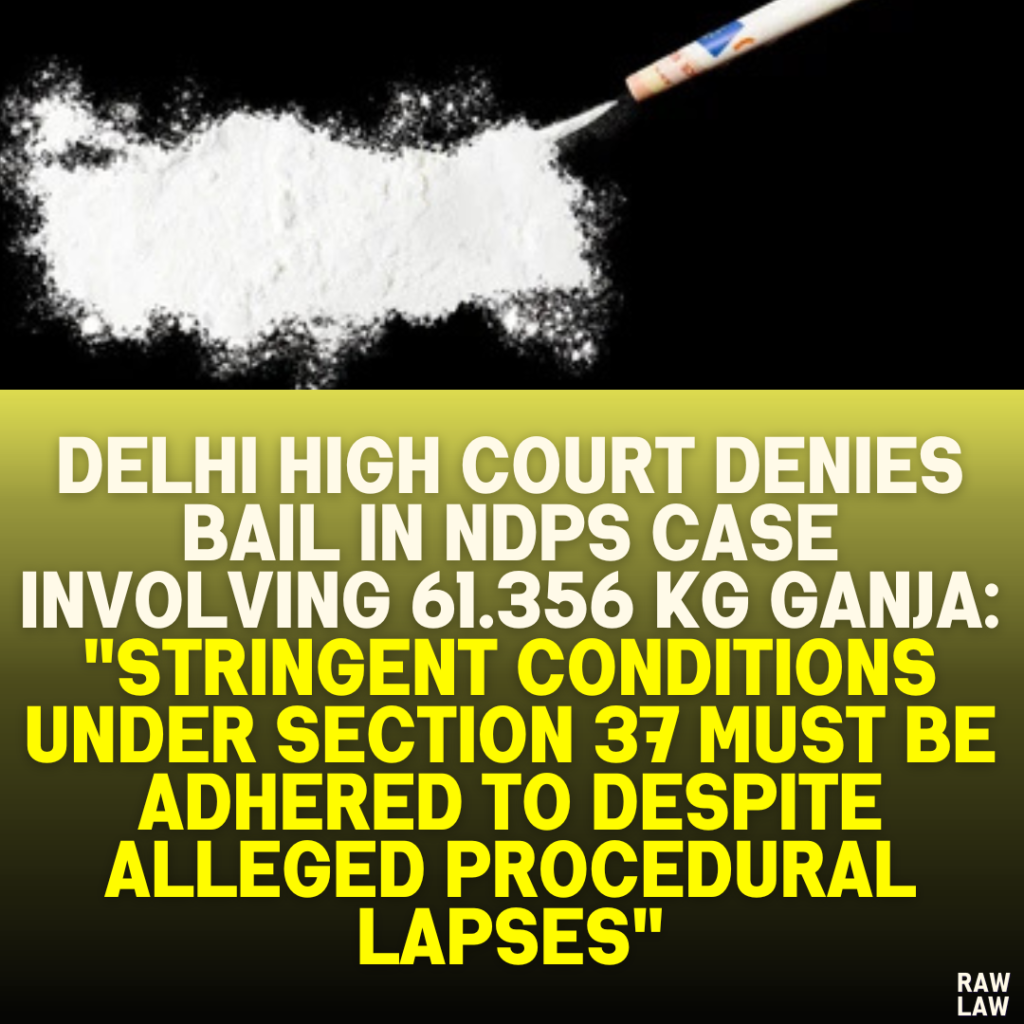Court’s Decision
The Delhi High Court rejected the petitioner’s plea for bail in a case involving the alleged possession of 61.356 kg of ganja, a commercial quantity under the Narcotic Drugs and Psychotropic Substances Act, 1985 (NDPS Act). The Court emphasized the stringent requirements under Section 37 of the Act, stating:
“The alleged procedural lapses do not vitiate the proceedings at this stage and are matters to be examined during trial.”
The court concluded that the petitioner failed to satisfy the twin conditions under Section 37 for the grant of bail.
Facts of the Case
- Incident Overview: On May 17, 2023, based on confidential information, the Narcotics Squad conducted a raid at the petitioner’s rented residence in Raghubir Nagar, Delhi.
- Seizure: Two bags containing 61.356 kg of ganja were recovered from the premises. No contraband was found during the personal search of the petitioner or co-accused Anil Jha.
- Investigation Process: The investigation included compliance with Sections 42 and 50 of the NDPS Act. The contraband was seized, and samples were sent for forensic analysis.
- Chargesheet: A chargesheet was filed against the petitioner under Sections 20 and 29 of the NDPS Act.
Issues
- Procedural Compliance: Whether procedural lapses in complying with Sections 42 and 50 of the NDPS Act affect the investigation at the bail stage.
- Bail Conditions under Section 37: Whether the petitioner meets the stringent twin conditions required under Section 37 for the grant of bail.
Petitioner’s Arguments
- Procedural Irregularities:
- The raid violated Section 42 of the NDPS Act as it occurred after sunset without obtaining the mandatory search warrant.
- The mandatory provisions of the NDPS Act and the Criminal Procedure Code (Cr.P.C.) were allegedly not adhered to during the investigation.
- Age and Health: The petitioner, aged 67, has been in custody since May 17, 2023. Prolonged incarceration was argued as a ground for bail.
- Reliance on Precedents:
- The petitioner cited cases like State of Punjab v. Balbir Singh and Union of India v. Shiv Shanker Kesari to argue that non-compliance with procedural safeguards vitiates the investigation.
Respondent’s Arguments
- Commercial Quantity and Stringent Provisions: The contraband recovered was of a commercial quantity, which invokes the stringent conditions of Section 37 of the NDPS Act.
- Procedural Lapses Not Decisive at Bail Stage:
- The prosecution argued that procedural irregularities, if any, are matters for trial and do not justify bail at this stage.
- It emphasized that the court must focus on the statutory mandate under Section 37 when considering bail.
- Public Interest: The prosecution stressed that granting bail on grounds like age or alleged procedural lapses would undermine the NDPS Act’s objective of combating drug trafficking.
Analysis of the Law
- Section 37 of the NDPS Act:
- The section imposes two stringent conditions for bail in cases involving commercial quantities:
- The court must have reasonable grounds to believe the accused is not guilty.
- The accused must not be likely to commit an offense while on bail.
- The court clarified that the term “reasonable grounds” requires more than prima facie evidence. It mandates a substantial basis to believe the accused is not guilty.
- The section imposes two stringent conditions for bail in cases involving commercial quantities:
- Procedural Compliance Under Section 42:
- The court acknowledged the procedural lapses but cited Karnail Singh v. State of Haryana to state that delayed compliance with procedural requirements can be justified in cases of urgency.
- The court relied on Khet Singh v. Union of India to clarify that procedural irregularities do not render evidence inadmissible unless they cause serious prejudice to the accused.
Precedent Analysis
The court referred to multiple judgments to interpret the scope of Section 37 and procedural compliance under the NDPS Act:
- Collector of Customs v. Ahmadalieva Nodiraa: Explained the term “reasonable grounds” as requiring more than prima facie evidence.
- Union of India v. Shiv Shanker Kesari: Reiterated the stringent requirements for granting bail in NDPS cases.
- Karnail Singh v. State of Haryana: Permitted delayed compliance with procedural safeguards in emergent situations.
Court’s Reasoning
- Non-Compliance with Procedural Safeguards: The court held that procedural lapses, such as conducting the raid after sunset, do not vitiate the proceedings at the bail stage. These are matters to be examined during the trial.
- Prima Facie Evidence: There was sufficient prima facie evidence linking the petitioner to the contraband.
- Stringent Conditions Under Section 37: The court found that the petitioner failed to satisfy the twin conditions of Section 37, particularly the requirement of proving “reasonable grounds” for non-guilt.
Conclusion
The bail application was dismissed, with the court holding:
“The stringent conditions imposed under Section 37 of the NDPS Act must be adhered to in their true spirit to curb the menace of drug trafficking.”
Implications
The judgment highlights the following:
- Tough Stance on Drug Trafficking: The court reaffirmed the NDPS Act’s objective to curb drug trafficking through strict bail provisions.
- Procedural Flexibility at Bail Stage: Procedural lapses, unless egregiously prejudicial, do not significantly affect bail considerations.
- Guidance for Future Cases: The decision serves as a precedent for interpreting Section 37 and procedural compliance under the NDPS Act.
This detailed judgment reflects a balance between procedural fairness and the legislature’s intent to deter drug offenses. It underscores the necessity of stringent compliance while leaving procedural questions to be adjudicated during trial.
